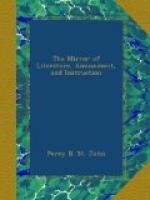Of this very point I have availed myself. Let me add that Paul Pry was never intended as the representative of any one individual, but a class. Like the melancholy of Jaques, he is “compounded of many Simples;” and I could mention five or six who were unconscious contributors to the character.—That it should have been so often, though erroneously, supposed to have been drawn after some particular person, is, perhaps, complimentary to the general truth of the delineation.
With respect to the play, generally, I may say that it is original: it is original in structure, plot, character, and dialogue—such as they are. The only imitation I am aware of is to be found in part of the business in which Mrs. Subtle is engaged: whilst writing those scenes I had strongly in my recollection Le Vieux Celibataire. But even the little I have adopted is considerably altered and modified by the necessity of adapting it to the exigencies of a different plot.—New Monthly Magazine.
* * * * *
MAUREEN.
The cottage is here as of old I remember,
The pathway is worn as it
always hath been;
On the turf-piled hearth there still lives
a bright ember;—
But where is Maureen?
The same pleasant prospect still lieth
before me,
The river—the mountain—the
valley of green,
And Heaven itself (a bright blessing!)
is o’er me;—
But where is Maureen?
Lost! Lost!—Like a dream
that hath come and departed,
(Ah, why are the loved and
the lost ever seen!)
She has fallen—hath flown,
with a lover false-hearted;—
So, mourn for Maureen.
And she who so loved her is slain—(the
poor mother!)
Struck dead in a day by a
shadow unseen,
And the home we once loved is the home
of another,
And lost is Maureen.
Sweet Shannon, a moment by thee let me
ponder,
A moment look back at the
things that have been,
Then, away to the world where the ruin’d
ones wander,
To seek for Maureen.
Pale peasant—perhaps, ’neath
the frown of high Heaven,
She roams the dark deserts
of sorrow unseen,
Unpitied—unknown; but I—I
shall know even
The ghost of Maureen.
New Monthly Magazine.
* * * * *
THE BURIAL IN THE DESERT.
BY MRS HEMANS.
How weeps yon gallant Band
O’er him their valour could not
save!
For the bayonet is red with gore,
And he, the beautiful and brave,
Now sleeps in Egypt’s sand.—WILSON.
In the shadow of the Pyramid
Our brother’s grave
we made,
When the battle-day was done,
And the Desert’s parting sun
A field of death survey’d.




